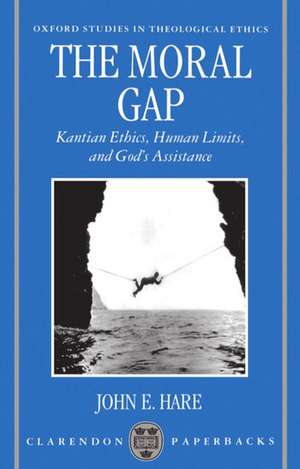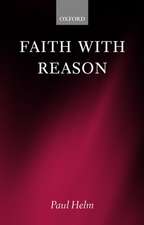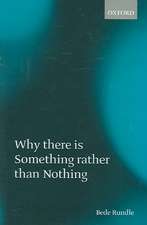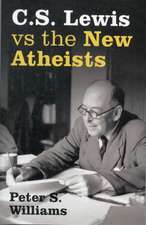The Moral Gap: Kantian Ethics, Human Limits, and God's Assistance: Oxford Studies in Theological Ethics
Autor John E. Hareen Limba Engleză Paperback – mai 1997
Preț: 375.68 lei
Preț vechi: 484.60 lei
-22% Nou
Puncte Express: 564
Preț estimativ în valută:
71.89€ • 75.59$ • 59.40£
71.89€ • 75.59$ • 59.40£
Carte tipărită la comandă
Livrare economică 05-11 aprilie
Preluare comenzi: 021 569.72.76
Specificații
ISBN-13: 9780198269571
ISBN-10: 0198269579
Pagini: 302
Dimensiuni: 137 x 215 x 18 mm
Greutate: 0.43 kg
Ediția:Revised
Editura: Clarendon Press
Colecția Clarendon Press
Seria Oxford Studies in Theological Ethics
Locul publicării:Oxford, United Kingdom
ISBN-10: 0198269579
Pagini: 302
Dimensiuni: 137 x 215 x 18 mm
Greutate: 0.43 kg
Ediția:Revised
Editura: Clarendon Press
Colecția Clarendon Press
Seria Oxford Studies in Theological Ethics
Locul publicării:Oxford, United Kingdom
Recenzii
an impressive book
This book is a very careful piece of moral philosophy. Anyone interested in the intersection of religion and moral values should find food for thought.
this careful, rigorous contribution to the series of Oxford Studies in Theological Ethics looks prudently round the corners, investigates the blind alleys, turns over the stones, and leaves the reader intellectually stretched and well instructed, if not greatly inspired. Hare's is a worthy undertaking to remind us of the Christian dimensions to our philosophical traditions, to demonstrate "the credibility of a God who loves us enough both to demand a high standard from us and to help us to meet it". It is heavy, steady, rigorous, demanding reading.
With the book under review written by the son of a famous father, it is fascinaitng to observe their very different approaches ... the most impressive section of the book lies in his treatment of the impact of Christ on ethics, where a strong defence of the notion of incorporation is offered, and he gives a good critique of Richard Swinburne on forgiveness.
This is a worthwhile book which interestingly ventilates the problem of the gap between what we ought to do and what we can do. It would be useful as a teaching book ... John Hare is clear-minded and fair-minded, and he writes plainly and lucidly. He aims at being accessible ... and succeeds remarkably well, not only in presenting his own arguments, but in expounding the thought of other people ... The book is practical in giving plenty of applications and examples.
This is a singular contribution to the reintroduction of Kant's ethics into the contemporary debates in philosophical and theological ethics.
A fine argument-packed book ... an informed, skillful and persuasive interpreter of Kant's ethics ... This unusual, resourceful, well-argued and wide-ranging book on a topic of manifest importance should be bought or ordered for the library, and read.
All told, this book can give anyone who works through it a better grasp of what it means to be moral and of how Christianity addresses the gap that even most secular philosophers find to yawn between what we are and what we ought to be.
This book is a very careful piece of moral philosophy. Anyone interested in the intersection of religion and moral values should find food for thought.
this careful, rigorous contribution to the series of Oxford Studies in Theological Ethics looks prudently round the corners, investigates the blind alleys, turns over the stones, and leaves the reader intellectually stretched and well instructed, if not greatly inspired. Hare's is a worthy undertaking to remind us of the Christian dimensions to our philosophical traditions, to demonstrate "the credibility of a God who loves us enough both to demand a high standard from us and to help us to meet it". It is heavy, steady, rigorous, demanding reading.
With the book under review written by the son of a famous father, it is fascinaitng to observe their very different approaches ... the most impressive section of the book lies in his treatment of the impact of Christ on ethics, where a strong defence of the notion of incorporation is offered, and he gives a good critique of Richard Swinburne on forgiveness.
This is a worthwhile book which interestingly ventilates the problem of the gap between what we ought to do and what we can do. It would be useful as a teaching book ... John Hare is clear-minded and fair-minded, and he writes plainly and lucidly. He aims at being accessible ... and succeeds remarkably well, not only in presenting his own arguments, but in expounding the thought of other people ... The book is practical in giving plenty of applications and examples.
This is a singular contribution to the reintroduction of Kant's ethics into the contemporary debates in philosophical and theological ethics.
A fine argument-packed book ... an informed, skillful and persuasive interpreter of Kant's ethics ... This unusual, resourceful, well-argued and wide-ranging book on a topic of manifest importance should be bought or ordered for the library, and read.
All told, this book can give anyone who works through it a better grasp of what it means to be moral and of how Christianity addresses the gap that even most secular philosophers find to yawn between what we are and what we ought to be.




























